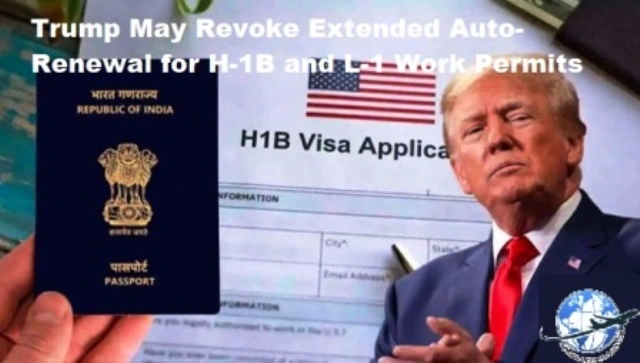In a significant development for foreign workers in the United States, two Republican Senators recently introduced a resolution to reverse a Biden-era rule that extended the auto-renewal period for work permits, including H-1B and L-1 work permits. This change, if passed, could have far-reaching effects, especially for Indian nationals, who represent a large proportion of visa holders in these categories. This article explores what the rule entails, why it’s important for H-1B and L-1 visa holders, and what changes may be coming soon.
Trump May Revoke Extended Auto-Renewal for H-1B and L-1 Work Permits: Key Changes You Should Know
The Biden-Era Rule: Extension of Auto-Renewal for Work Permits
On January 13, the U.S. Department of Homeland Security (DHS) finalized a rule extending the auto-renewal period for work permits from 180 days to 540 days. This extension applied to various categories of immigrants, including:
- Immigrants
- Refugees
- Green Card holders
- Spouses of H-1B visa and L-1 visa holders
This rule change was designed to ease the burden on foreign workers, especially in sectors like technology and healthcare, where the need for specialized talent is ever-growing.
How the Rule Benefited Indian Nationals
Indian nationals, especially those in IT and corporate sectors, have greatly benefited from this rule. The U.S. issues a significant number of H-1B visas (most of which are held by Indian professionals). With this auto-renewal extension, many foreign workers, particularly Indians, could continue working without frequent renewals.
In 2023, for instance:
- 72% of all H-1B visas issued were granted to Indian nationals.
- 76,671 L-1 visas and 83,277 L-2 visas were issued in 2023, many of which were given to Indian workers, as well.
This extension has been crucial in providing job security and stability to thousands of Indian professionals working in the U.S.
The Republican Resolution: Reversing the Extension
Republican Senators John Kennedy and Rick Scott introduced a resolution under the Congressional Review Act (CRA), aiming to revoke the auto-renewal extension for H-1B and L-1 visa holders. They argue that the Biden administration’s rule compromises the U.S.’s immigration system, claiming it could allow illegal aliens to stay and work in the U.S. for extended periods without proper authorization.
Key Arguments from Senators Kennedy and Scott:
| Argument | Details |
|---|---|
| Concerns About Immigration | The extended auto-renewal could reduce enforcement of U.S. immigration laws. |
| Job Security for Americans | They argue it may harm American workers by allowing non-citizens to hold jobs longer without authorization. |
| Enforcement Issues | A rollback would help the Trump administration’s efforts to track individuals living and working in the U.S. illegally. |
If the resolution succeeds, H-1B and L-1 visa holders may no longer be able to rely on the extended auto-renewal period, making it more difficult to maintain work permits for extended periods.
What are H-1B, H-4, L-1, and L-2 Visas?
For those unfamiliar with U.S. work visas, it’s essential to understand the distinctions between different visa types like H-1B, L-1, and their associated dependent visas (H-4, L-2).
| Visa Type | Description |
|---|---|
| H-1B Visa | For foreign professionals in specialized fields like technology and engineering. Requires a bachelor’s degree or higher. |
| H-4 Visa | For dependents (spouses and children under 21) of H-1B visa holders. Some may be eligible for work authorization. |
| L-1 Visa | For employees transferred by multinational companies to work in U.S. branches. Divided into L-1A (executives) and L-1B (specialized knowledge workers). |
| L-2 Visa | For dependents of L-1 visa holders, allowing spouses and children to live and work or study in the U.S. |
How the Rule Change Could Affect Indians
Indians, especially in the IT sector, make up a large portion of H-1B and L-1 visa holders. The extension of automatic work permit renewal has been particularly beneficial for them, as it gave more stability and time to work in the U.S.
Without the extension, workers may have to go through renewal processes more frequently, which could create job uncertainty. The potential rollback by Republicans could impact thousands of Indian workers in the U.S., especially those in technology, healthcare, and multinational corporate sectors.
Implications of Reversing the Auto-Renewal
If the Trump administration’s efforts to revoke the automatic extension succeed, it could significantly impact foreign workers’ stability in the U.S. Here’s a breakdown of the implications:
| Impact | Details |
|---|---|
| Renewal Frequency | Workers may need to renew permits more often, causing job instability. |
| Employment Gaps | Delays in renewals may create gaps in employment for foreign workers. |
| Increased Bureaucracy | More paperwork and procedures for visa holders may overwhelm both employees and employers. |
Conclusion: What’s Next for H-1B and L-1 Visa Holders?
The potential reversal of the extended auto-renewal for H-1B and L-1 work permits could create uncertainty for thousands of foreign workers, particularly Indian nationals. While the Biden administration’s rule was aimed at easing the burden on these workers, the Republican push to overturn it reflects broader concerns about U.S. immigration enforcement.
Workers should stay updated on the developments surrounding this issue. If the rule is rolled back, H-1B and L-1 visa holders may need to prepare for more frequent renewals, which could impact their employment status in the U.S.



